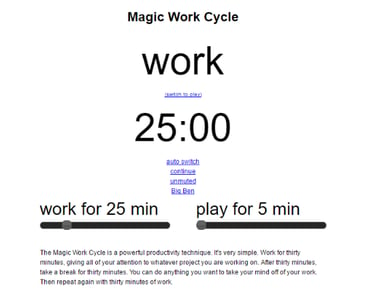 Imagine walking through the city on a bright, sunny day, when you’re approached by a person holding a clipboard. Would you be more likely to stop and listen if the person says:
Imagine walking through the city on a bright, sunny day, when you’re approached by a person holding a clipboard. Would you be more likely to stop and listen if the person says:
“Would you be willing to take a survey for me?”
or
“Could I have just two minutes of your time?”
If you’re like me, the second request seems easier to agree to than the first. I don’t want to waste my day taking some random survey, but I suppose I can spare two minutes.
Now, apply the same principle to starting homework. Is your teenage son more likely to get to work on that essay he’s been putting off if you say:
“Can you get started on your essay?”
or
“Can you spend 20 minutes working on your essay?”
One of the reasons it’s so hard to get started on homework (or other undesired activities) is that we don’t know when we’re going to finish. Because of that, starting that project you’ve been putting off feels like tumbling into an abyss of endless non-fun time, rather than just one small part of a regular day. So, when motivating your kids (or yourself) to start something work-related, it might be just as worthwhile to talk about when it’s going to end as when it’s going to begin. This makes the commitment concrete and bite-sized.
How to make a big project manageable
There are many aspects of life where we willingly take on challenges because we look forward to the visceral achievement at the end. This, in fact, is the principle that makes video games so addicting: They woo the player into putting forth effort and time with the tacit promise that the effort and time will be rewarded. Breaking tasks into time-limited chunks borrows that effect. Your son isn’t sure he can finish the essay satisfactorily, so he doesn’t want to start. But if you substitute a more manageable challenge — simply working on it for 20 minutes — there’s at least some feeling of accomplishment when the 20-minute timer goes off.
Using distraction to be productive
Harnessing time like this also allows you to control and make use of distraction. First, and most obviously, it’s easier to prevent yourself from becoming distracted when you know you only have to hang in there for a few more minutes. And, more subtly, using a timer distracts you from the bigger challenge (finishing the essay) by directing focus toward a smaller one (work on it for 20 minutes).
The pomodoro
One popular method of promoting starting work by keeping its end in sight is called the “pomodoro technique.” (Pomodoro is the Italian word for tomato, and the technique was invented by a person using a tomato-shaped egg timer, like this one.) The pomodoro technique is structured and regimented: Set the timer for 25 minutes and get to work; when the timer goes off, take a 5-minute break. After the five-minute break, start another 25 minutes. After four of these intervals (called “pomodoros”), take a 20-30 minute break.
The tool that helps me get work started
 There are many apps and websites that will keep track of pomodoros for you. What I’ve found, however, is that I need a tool that’s more flexible. (Sometimes even 25 minutes feels like too much time!) I’ve tried many of these apps and websites, but the one I keep coming back to is called Magic Work Cycle. It’s reassuringly simple. As you can see from the screenshot here, there are just two timers on the page, each with sliders that allow you to adjust the length of your work and break intervals. It defaults to 30 minutes each, but can be set for as short as one minute or as long as two hours. The timer starts automatically when you load the page, so you can just open the page and get started, adjusting the timers if you so choose. You’ll hear a simple chime after an interval ends letting you know to switch from work to break or from break to work. (This method also synergizes extremely well with technological tools that can block out distractions for a period of time, like StayFocusd or Forest.)
There are many apps and websites that will keep track of pomodoros for you. What I’ve found, however, is that I need a tool that’s more flexible. (Sometimes even 25 minutes feels like too much time!) I’ve tried many of these apps and websites, but the one I keep coming back to is called Magic Work Cycle. It’s reassuringly simple. As you can see from the screenshot here, there are just two timers on the page, each with sliders that allow you to adjust the length of your work and break intervals. It defaults to 30 minutes each, but can be set for as short as one minute or as long as two hours. The timer starts automatically when you load the page, so you can just open the page and get started, adjusting the timers if you so choose. You’ll hear a simple chime after an interval ends letting you know to switch from work to break or from break to work. (This method also synergizes extremely well with technological tools that can block out distractions for a period of time, like StayFocusd or Forest.)
Still unsure if this will be helpful for you or your child? Don’t feel like you have to make it permanent life change -- just try it for 25 minutes!
Does your child need help breaking down projects into smaller, achievable chunks? Download our Project Planner Guide — try using it with Magic Work Cycle to help your child get started on a long-term project.
Dan Messier is an Executive Function coach with Beyond BookSmart from Holbrook, MA. He received his bachelor's in English from Eastern Nazarene College in Quincy, Mass., and his master's in English composition from the University of Massachusetts Boston, where he has taught first-year writing as a member of the English department since 2010.

